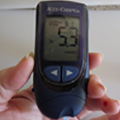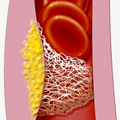Managing Your Diabetes

Knowing Your Numbers
The following tests can be done with a finger prick, on site at the Wellness Center and monthly at the Senior Center

Cholesterol
Types of cholesterol:
HDL(good ) (Greater than 40 for men and women Greater than 50, LDL (not good) (less than 100, with diabetes 70 or less) total cholesterol (less than 200) A1C: A test that revels blood sugar control over a 3 month period, normal: 4-6 persons with diabetes 7 or less

Blood Pressure Checks
American Heart Association Standard:
less than 120/80 Persons with Diabetes less than 140/90









